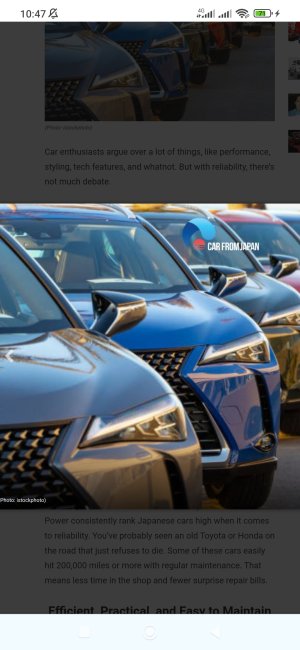Japanese brands work and focus on crucial upgrades that truly improve performance (Photo: istockphoto)
A History of Smart Engineering
As we all know, the Japanese culture has a long history of excellence and a philosophy of perfecting everything they do. Japanese car manufacturers continually fine-tune their designs using various real-world data. You can Google the history of some popular brands and see for yourself how they are constantly improving their vehicles.
As an example, let’s take Toyota’s famous “Kaizen” philosophy, which means “continuous improvement.” This philosophy helps them create cars that last decades because they want them to last. And that’s precisely why you still see well-maintained Japanese models from the ‘90s and early 2000s that are running smoothly today and will run tomorrow.
Japanese brands work and focus on crucial upgrades that truly improve performance, safety, efficiency, and durability. They are not into gimmicks; instead, they’re looking forward to improving what already works and fine-tuning their products to be perfect, like a Zen Garden or a Katana.
Their dedication to innovations and, at the same time, not overcomplicated engineering is the reason car enthusiasts all over the globe prefer and love Japanese cars, generation after generation.
Bottom Line
This is quite obvious. If you want a car that, first of all, won’t let you down, will not be a rip-off to maintain, and, even after years of exploitation, still holds its value, then Japanese cars are your choice.
They have been proving their reliability for decades and decades, and there are no signs that they are going to change their famous perfection approach.
So, if you have an intention to purchase a new state-of-the-art and innovation-packed car or think of finding a reliable used car, with Japanese cars, you’re always hitting a sweet spot.
Just joined

 carfromjapan.com
carfromjapan.com
carfromjapan.com
carfromjapan.com
Used my reference code
CP-2JS96S2Y
saved 50 dollars
A History of Smart Engineering
As we all know, the Japanese culture has a long history of excellence and a philosophy of perfecting everything they do. Japanese car manufacturers continually fine-tune their designs using various real-world data. You can Google the history of some popular brands and see for yourself how they are constantly improving their vehicles.
As an example, let’s take Toyota’s famous “Kaizen” philosophy, which means “continuous improvement.” This philosophy helps them create cars that last decades because they want them to last. And that’s precisely why you still see well-maintained Japanese models from the ‘90s and early 2000s that are running smoothly today and will run tomorrow.
Japanese brands work and focus on crucial upgrades that truly improve performance, safety, efficiency, and durability. They are not into gimmicks; instead, they’re looking forward to improving what already works and fine-tuning their products to be perfect, like a Zen Garden or a Katana.
Their dedication to innovations and, at the same time, not overcomplicated engineering is the reason car enthusiasts all over the globe prefer and love Japanese cars, generation after generation.
Bottom Line
This is quite obvious. If you want a car that, first of all, won’t let you down, will not be a rip-off to maintain, and, even after years of exploitation, still holds its value, then Japanese cars are your choice.
They have been proving their reliability for decades and decades, and there are no signs that they are going to change their famous perfection approach.
So, if you have an intention to purchase a new state-of-the-art and innovation-packed car or think of finding a reliable used car, with Japanese cars, you’re always hitting a sweet spot.
Just joined

CFJ's Referral Program: Refer and Earn Unlimited Rewards - CAR FROM JAPAN
Unlock a world of unlimited rewards with CFJ's Referral Program! By introducing your friends and family to buy cars at Car From Japan, you'll not only help them discover the joy of car ownership, but you can also earn commission from us
Used my reference code
CP-2JS96S2Y
saved 50 dollars

